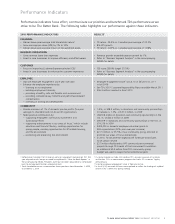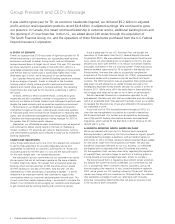TD Bank 2010 Annual Report Download - page 15
Download and view the complete annual report
Please find page 15 of the 2010 TD Bank annual report below. You can navigate through the pages in the report by either clicking on the pages listed below, or by using the keyword search tool below to find specific information within the annual report.
TD BANK GROUP ANNUAL REPORT 2010 MANAGEMENT’S DISCUSSION AND ANALYSIS 13
Impact of Foreign Exchange Rate on U.S. Personal and
Commercial Banking and TD Ameritrade Translated Earnings
U.S. Personal and Commercial Banking earnings and the Bank’s share
of earnings from TD Ameritrade are impacted by fluctuations in the
U.S. dollar to Canadian dollar exchange rate compared with last year.
Appreciation of the Canadian dollar had an unfavourable impact on
consolidated earnings for the year ended October 31, 2010, compared
with last year, as shown in the table below.
Impact of Foreign Exchange Rate on U.S. Personal and
Commercial Banking and TD Ameritrade Translated Earnings
(millions of Canadian dollars) 2010 vs. 2009
U.S. Personal and Commercial Banking
Decreased total revenue − adjusted $ 602
Decreased non-interest expenses − adjusted 352
Decreased net income − adjusted, after tax 129
Decreased net income − reported, after tax 120
TD Ameritrade
Decreased share of earnings, after tax $ 42
Decrease in earnings per share − adjusted $ 0.20
Decrease in earnings per share − reported $ 0.19
U.S. GAAP
See the Reconciliation of Canadian and U.S. Generally Accepted
Accounting Principles contained in the Bank’s annual report on Form
40-F for fiscal 2010 filed with the U.S. Securities and Exchange
Commission
(SEC) and available on the Bank’s website at http://www.
td.com/investor/index.jsp and at the SEC’s website (http://www.sec.gov).
Net income available to common shareholders under U.S. GAAP
was $4,931 million, compared with $4,450 million under Canadian
GAAP. The higher U.S. GAAP net income available to common share-
holders primarily resulted from an increase in income due to the
de-designation of certain fair value and cash flow hedging relationships
that were designated under Canadian GAAP and the reversal of the
insurance provision related to the provision for adverse deviation with
insurance contracts under Canadian GAAP.
FINANCIAL RESULTS OVERVIEW
Net Income
AT A GLANCE OVERVIEW
• Reported net income was $4,644 million, an increase
of $1,524 million, or 49%, from the prior year.
• Adjusted net income was $5,228 million, an increase
of $512 million, or 11%, from the prior year.
Reported net income for the year was $4,644 million, compared
with $3,120 million last year. Adjusted net income for the year was
$5,228 million, compared with $4,716 million last year. The increase
in adjusted net income was primarily due to stronger earnings in
the Canadian Personal and Commercial Banking, U.S. Personal and
Commercial Banking, and Wealth Management segments, partially
offset by decreased earnings from the Wholesale Banking segment and
an increased loss in the Corporate segment. Canadian Personal and
Commercial Banking earnings increased due to broad-based revenue
and volume growth across most banking products and a decline in
provision for credit losses (PCL). U.S. Personal and Commercial Banking
earnings increased due to higher fee-based revenue, volume growth,
and lower PCL on debt securities, partially offset by higher expenses
and the translation effect of a stronger Canadian dollar. Wealth
Management earnings increased due to higher fee-based revenue
related to higher client assets, and improved net interest margin,
partially offset by lower earnings in TD Ameritrade and the translation
effect of a stronger Canadian dollar. Wholesale Banking earnings
decreased primarily due to a less favourable market environment. The
loss in the Corporate segment increased primarily due to an increase in
net corporate expenses, higher net securitization losses, and the impact
of favourable tax-related and other items reported last year, partially
offset by lower losses associated with hedging and treasury activities.
Reported diluted earnings per share were $5.10 this year, a 47%
increase, compared with $3.47 last year. Adjusted diluted earnings per
share were $5.77, an 8% increase, compared with $5.35 last year.
























